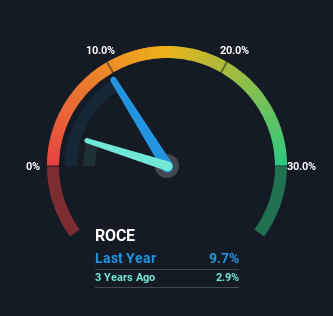Here's What's Concerning About Portmeirion Group's (LON:PMP) Returns On Capital
If you're looking for a multi-bagger, there's a few things to keep an eye out for. One common approach is to try and find a company with returns on capital employed (ROCE) that are increasing, in conjunction with a growing amount of capital employed. If you see this, it typically means it's a company with a great business model and plenty of profitable reinvestment opportunities. However, after briefly looking over the numbers, we don't think Portmeirion Group (LON:PMP) has the makings of a multi-bagger going forward, but let's have a look at why that may be.
What Is Return On Capital Employed (ROCE)?
If you haven't worked with ROCE before, it measures the 'return' (pre-tax profit) a company generates from capital employed in its business. The formula for this calculation on Portmeirion Group is:
Return on Capital Employed = Earnings Before Interest and Tax (EBIT) ÷ (Total Assets - Current Liabilities)
0.097 = UK£7.2m ÷ (UK£103m - UK£29m) (Based on the trailing twelve months to June 2023).
Thus, Portmeirion Group has an ROCE of 9.7%. On its own, that's a low figure but it's around the 11% average generated by the Consumer Durables industry.
Check out our latest analysis for Portmeirion Group
In the above chart we have measured Portmeirion Group's prior ROCE against its prior performance, but the future is arguably more important. If you'd like, you can check out the forecasts from the analysts covering Portmeirion Group here for free.
So How Is Portmeirion Group's ROCE Trending?
On the surface, the trend of ROCE at Portmeirion Group doesn't inspire confidence. Over the last five years, returns on capital have decreased to 9.7% from 20% five years ago. However it looks like Portmeirion Group might be reinvesting for long term growth because while capital employed has increased, the company's sales haven't changed much in the last 12 months. It's worth keeping an eye on the company's earnings from here on to see if these investments do end up contributing to the bottom line.
In Conclusion...
Bringing it all together, while we're somewhat encouraged by Portmeirion Group's reinvestment in its own business, we're aware that returns are shrinking. And investors may be expecting the fundamentals to get a lot worse because the stock has crashed 75% over the last five years. All in all, the inherent trends aren't typical of multi-baggers, so if that's what you're after, we think you might have more luck elsewhere.
Portmeirion Group does have some risks, we noticed 3 warning signs (and 1 which shouldn't be ignored) we think you should know about.
While Portmeirion Group isn't earning the highest return, check out this free list of companies that are earning high returns on equity with solid balance sheets.
Have feedback on this article? Concerned about the content? Get in touch with us directly. Alternatively, email editorial-team (at) simplywallst.com.
This article by Simply Wall St is general in nature. We provide commentary based on historical data and analyst forecasts only using an unbiased methodology and our articles are not intended to be financial advice. It does not constitute a recommendation to buy or sell any stock, and does not take account of your objectives, or your financial situation. We aim to bring you long-term focused analysis driven by fundamental data. Note that our analysis may not factor in the latest price-sensitive company announcements or qualitative material. Simply Wall St has no position in any stocks mentioned.

